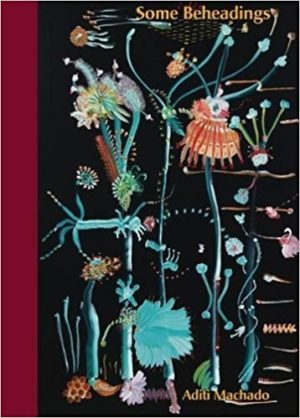In Their Own Words
Aditi Machado on “Archaic”

Archaic
I thought this was a way a new way.
I wanted to call it human.
Speech! Speech! it's been wept before.
It was a work to stand in the sun that erosion.
What is regal is pain is pain legal?
Speech? After each time I lost the right under a legislature so commonly verdant.
Speech? The only way is to turn outside turn into an outside. There a lip.
A lip at the end of town not the seashore.
A new way I kept thinking a new grammar of replacement not I I'd rather be spit.
Standing on my lip like a promontory standing archaic.
Standing on my lip like a promontory why this staging why these dark
lines of surplus harmony these elastic expenditures such supernumerary stars?
So I could speech I needed the staging of mouths opening like kinds opening all kinds of meteors.
Something opened a space for me but I'd asked for time so long planets so long plants.
Then I spoke a spoke.
I spoke a sentence and ye took offence.
I thought a new way burnished make that.
Irresistible propaganda.
I have nothing new for ye but an ancient latticework I rot.
From Some Beheadings (Nightboat Books, 2017). All rights reserved. Reprinted with the permission of the author.
On "Archaic"
I don't remember writing this poem, but I'll try to remember.
According to my notes, the first draft was composed on the third of August 2015. It was perhaps very warm that day and maybe I had gone for a walk. I read plenty that summer and missed going home for mangoes. I was steeped in the sentences of Etel Adnan, Rosmarie Waldrop, Marcel Proust, Lisa Robertson, and had not too long ago read a book which made to me the following revelation:
The Rhetorica ad Herennium, so far from supposing that all language consists of sentences, treats sententiae (pithy dicta) as figures of speech which should not be over-used.[1]
One of my journal entries in the month of August 2015 reads:
Saw German's HARD TO BE A GOD yesterday. In it a character says they don't want to kill scholars, only scholars in doubt.
I was in the midst of some very scholarly writing—about Adnan and translation and sentences/sententiae. I was definitely eating peaches.
This, I think, is the poem's narrative of genesis. Or a guess at it. It doesn't seem to reveal very much except that I have a poor memory. It's not amnesia I suffer from but the tedium of events-in-sequence.
But if I think about "Archaic" not in terms of the circumstances which may have led to the writing of it but in terms of something like its occasion—as in, what occasioned it and what is its occasion, but not in time so much as in a discourse of very intense feeling, landscape, or weather ("Is weather temperature, is it definable, is it not oceanic, and metaphysical?"[2])—then its genesis looks different.
It looks like there is a landscape (mountainous, maritime, whatever) which is the stage, a public bit of relief just stark enough to constitute a proscenium and the speaker always finds a place like that from which to speak, or the place finds her.
There is some historic truthiness to the notion that poetry is overheard, a private communication made public. So the occasion of this poem is to attest an alternate history and alternate desire: to speak in public.
As in, what if everything "I" spoke had a public use and it wasn't daring to speak so much as having to speak, but only occasionally, and everything I spoke had to be very precise, very wise, and rhythmic?
[1] Ian Robinson. The Establishment of Modern English Prose in the Reformation and the Enlightenment. 1998.
[2] Etel Adnan. Seasons. 2008.



